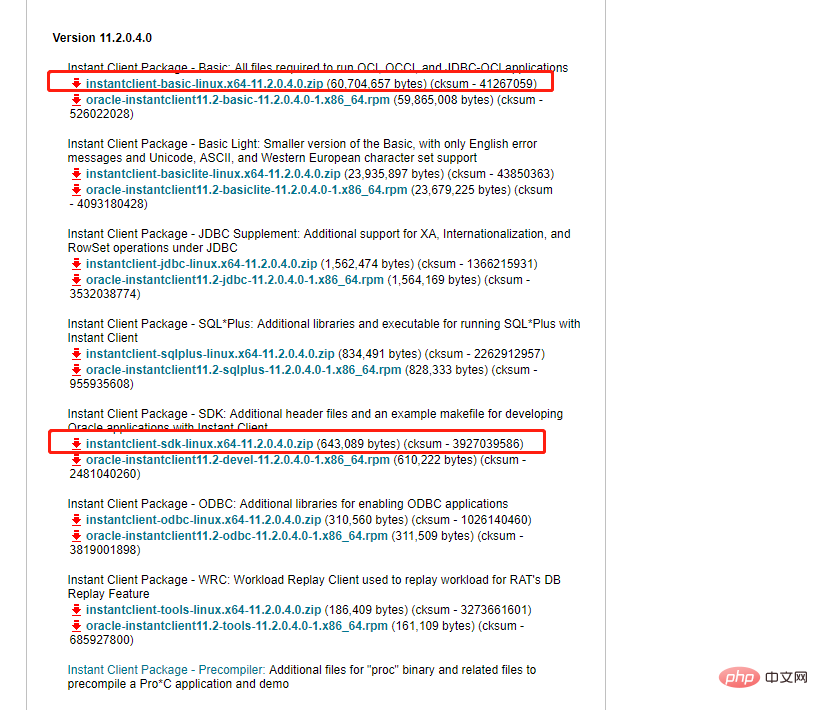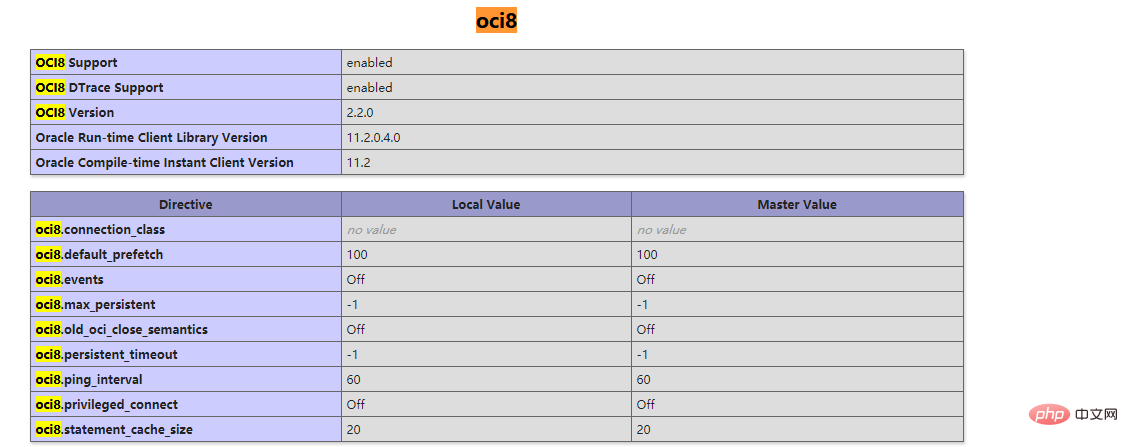How to install pdo-oci extension in linux php
How to install the pdo-oci extension in linux php: 1. Install the Oracle client; 2. Enter the php source code installation package and execute make; 3. Add "extension=pdo_oci." to the php.ini configuration. so" can be done.

The operating environment of this article: linux5.9.8 system, php version 7.1.25, DELL G3 computer
How to install pdo in linux php -oci extension?
Installing php extensions pdo_oci and oci8 under Linux:
This installation of the extension took me most of the day, and I hereby record the details As for the installation process, I hope this tutorial can help everyone and avoid detours during the installation process.
There are related environments on the CentOS server: apache2, php7
Need to install: 1.oracle client, 2.oci8 extension, 3.pdo_oci extension
1. Installation Oracle client
Oracle client can be downloaded from the oracle official website (https://www.oracle.com/technetwork/topics/linuxx86-64soft-092277.html)

Select the two installation packages above, download to /usr/local/src and then decompress:
unzip instantclient-basic-linux.x64-11.2.0.4.0.zip unzip instantclient-sdk-linux.x64-11.2.0.4.0.zip
Then enter the decompressed directory: cd instantclient_11_2/Put the following three Make a connection with the files
ln -s libnnz11.so libnnz.so ln -s libclntsh.so.11.1 libclntsh.so ln -s libocci.so.11.1 libocci.so
Then move the decompressed directory to the /usr/local/lib directory and rename it to 'instantclient' mv ./instantclient_11_2 /usr/local /lib/instantclient
2. Install the oci8 extension
Enter the source code installation package of PHP: cd /usr/local/src/php-7.1.25/ext/oci8/
Execute /usr/local/php/bin/phpize
and then execute: ./configure --with-php-config=/usr/local/php/ bin/php-config --with-oci8=shared,instantclient,/usr/local/lib/instantclient
Then execute make
Finally make install
Enter cd /usr/local/php/lib/php/extensions/no-debug-zts-20160303/ Check that the file oci8.so is installed, indicating that the installation is successful
The next step is to add extension=oci8.so in the php.ini configuration
3. Install the pdo_oci extension
Enter the source code installation package of PHP: cd /usr/local/src/php-7.1.25/ext/pdo_oci
Execute /usr/local/ php/bin/phpize
Then execute: ./configure --with-php-config=/usr/local/php/bin/php-config --with-pdo-oci =instantclient,/usr/local/lib/instantclient
Then execute make
Finally make install
Enter cd /usr/local/php/lib/php/extensions/no-debug-zts-20160303/ and check that the file pdo_oci.so is installed successfully.
The next step is to add a sentence to the php.ini configuration extension=pdo_oci.so
Check phpinfo. If there are oci8 and pdo_oci, the addition is successful


PHP Video Tutorial"
The above is the detailed content of How to install pdo-oci extension in linux php. For more information, please follow other related articles on the PHP Chinese website!

Hot AI Tools

Undresser.AI Undress
AI-powered app for creating realistic nude photos

AI Clothes Remover
Online AI tool for removing clothes from photos.

Undress AI Tool
Undress images for free

Clothoff.io
AI clothes remover

AI Hentai Generator
Generate AI Hentai for free.

Hot Article

Hot Tools

Notepad++7.3.1
Easy-to-use and free code editor

SublimeText3 Chinese version
Chinese version, very easy to use

Zend Studio 13.0.1
Powerful PHP integrated development environment

Dreamweaver CS6
Visual web development tools

SublimeText3 Mac version
God-level code editing software (SublimeText3)

Hot Topics
 1378
1378
 52
52
 How to start apache
Apr 13, 2025 pm 01:06 PM
How to start apache
Apr 13, 2025 pm 01:06 PM
The steps to start Apache are as follows: Install Apache (command: sudo apt-get install apache2 or download it from the official website) Start Apache (Linux: sudo systemctl start apache2; Windows: Right-click the "Apache2.4" service and select "Start") Check whether it has been started (Linux: sudo systemctl status apache2; Windows: Check the status of the "Apache2.4" service in the service manager) Enable boot automatically (optional, Linux: sudo systemctl
 What to do if the apache80 port is occupied
Apr 13, 2025 pm 01:24 PM
What to do if the apache80 port is occupied
Apr 13, 2025 pm 01:24 PM
When the Apache 80 port is occupied, the solution is as follows: find out the process that occupies the port and close it. Check the firewall settings to make sure Apache is not blocked. If the above method does not work, please reconfigure Apache to use a different port. Restart the Apache service.
 PHP and Python: Comparing Two Popular Programming Languages
Apr 14, 2025 am 12:13 AM
PHP and Python: Comparing Two Popular Programming Languages
Apr 14, 2025 am 12:13 AM
PHP and Python each have their own advantages, and choose according to project requirements. 1.PHP is suitable for web development, especially for rapid development and maintenance of websites. 2. Python is suitable for data science, machine learning and artificial intelligence, with concise syntax and suitable for beginners.
 The Enduring Relevance of PHP: Is It Still Alive?
Apr 14, 2025 am 12:12 AM
The Enduring Relevance of PHP: Is It Still Alive?
Apr 14, 2025 am 12:12 AM
PHP is still dynamic and still occupies an important position in the field of modern programming. 1) PHP's simplicity and powerful community support make it widely used in web development; 2) Its flexibility and stability make it outstanding in handling web forms, database operations and file processing; 3) PHP is constantly evolving and optimizing, suitable for beginners and experienced developers.
 How to restart the apache server
Apr 13, 2025 pm 01:12 PM
How to restart the apache server
Apr 13, 2025 pm 01:12 PM
To restart the Apache server, follow these steps: Linux/macOS: Run sudo systemctl restart apache2. Windows: Run net stop Apache2.4 and then net start Apache2.4. Run netstat -a | findstr 80 to check the server status.
 How to learn Debian syslog
Apr 13, 2025 am 11:51 AM
How to learn Debian syslog
Apr 13, 2025 am 11:51 AM
This guide will guide you to learn how to use Syslog in Debian systems. Syslog is a key service in Linux systems for logging system and application log messages. It helps administrators monitor and analyze system activity to quickly identify and resolve problems. 1. Basic knowledge of Syslog The core functions of Syslog include: centrally collecting and managing log messages; supporting multiple log output formats and target locations (such as files or networks); providing real-time log viewing and filtering functions. 2. Install and configure Syslog (using Rsyslog) The Debian system uses Rsyslog by default. You can install it with the following command: sudoaptupdatesud
 How to solve the problem that apache cannot be started
Apr 13, 2025 pm 01:21 PM
How to solve the problem that apache cannot be started
Apr 13, 2025 pm 01:21 PM
Apache cannot start because the following reasons may be: Configuration file syntax error. Conflict with other application ports. Permissions issue. Out of memory. Process deadlock. Daemon failure. SELinux permissions issues. Firewall problem. Software conflict.
 Does the internet run on Linux?
Apr 14, 2025 am 12:03 AM
Does the internet run on Linux?
Apr 14, 2025 am 12:03 AM
The Internet does not rely on a single operating system, but Linux plays an important role in it. Linux is widely used in servers and network devices and is popular for its stability, security and scalability.




